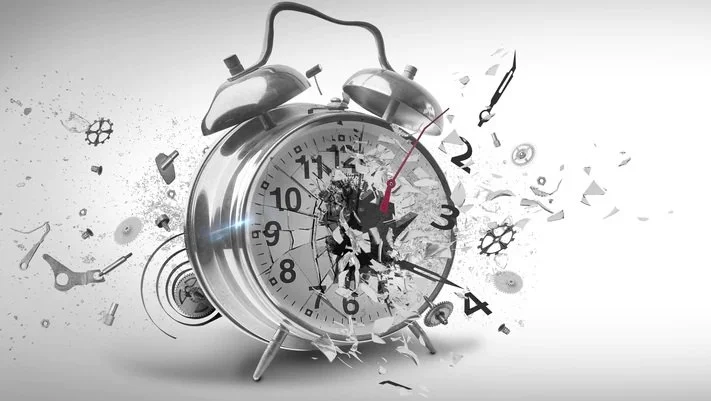Business professionals who are frustrated with traditional productivity methods, DaMar positions this time management as the answer to the outdated myths, creating urgency for change. This is an engaging topic for busy executives and professionals seeking practical, results-driven solutions.
The Fatal Flaw in Traditional Productivity
For decades, business professionals have been sold a lie. We've been told that the key to success lies in better "time management"—squeezing more tasks into our calendars, optimizing our schedules, and finding ways to do more in less time. But here's the uncomfortable truth: time management is a myth.
You cannot manage time. Time is constant, unchangeable, and indifferent to your productivity goals. You get 24 hours a day, 1,440 minutes, 86,400 seconds—no more, no less. While millions of professionals burn out trying to bend time to their will, a revolutionary framework called DaMar has emerged with a radically different approach: stop trying to manage time and start managing what you actually can control.
The Control Management Revolution: The DaMar Time Management Framework fundamentally redefines productivity by shifting focus from the impossible (managing time) to the achievable (managing control). This isn't just semantic wordplay—it's a philosophical revolution that changes everything about how successful professionals approach their work.
Instead of time management, DaMar advocates for control management, the strategic application of your control, focus, and discipline to drive measurable results. This shift alone eliminates the frustration and futility that plagues traditional productivity systems.
The Proximity to Revenue Filter: Your New Decision-Making Compass: Traditional productivity systems rely on vague prioritization methods—"urgent vs. important" matrices that leave professionals guessing about what truly matters. DaMar cuts through this confusion with a sophisticated yet simple filter: Proximity to Revenue.
Every activity, every task, every decision is evaluated based on its closeness to generating income. This creates a clear hierarchy that eliminates decision fatigue and ensures your energy flows toward activities that drive actual business results. Even relationship building gets strategically prioritized based on its potential to drive revenue outcomes.
This approach is particularly powerful because it transforms productivity from a game of activity management into a system of achievement management. The question shifts from "How can I get more done?" to "How can I generate more results?"
Sequential Focus: The Anti-Multitasking Stance: While the business world continues to celebrate multitasking as a professional virtue, neuroscience has revealed an uncomfortable truth: multitasking is actually inefficient task-switching that drains cognitive energy and reduces quality of work.
DaMar takes what some consider a radical stance by advocating for sequential focus—training your mind to operate in concentrated sequences rather than scattered attempts at simultaneous execution. This approach separates activity from actual achievement, recognizing that true productivity comes from depth, not breadth of simultaneous engagement. The results speak for themselves: professionals who master sequential focus report higher quality work, reduced mental fatigue, and significantly improved results per hour invested.
Work Smarter – More, Better, Faster: The Four-Pillar Principle: DaMar's productivity philosophy centers on a carefully ordered principle: "Work Smarter – More, Better, Faster." The sequence matters:
Smarter comes first, emphasizing strategic thinking as the foundation of all productive effort. Without strategic clarity, increased activity often leads to increased waste.
More refers to more results, not longer hours. This pillar focuses on amplifying impact rather than extending effort.
Better emphasizes quality of execution, recognizing that excellence in fewer areas often produces superior outcomes to mediocrity across many areas.
Faster addresses efficiency—not rushing, but eliminating waste and optimizing processes once the strategic foundation is solid.
The Architectural Calendar—Your Strategic Business Tool: Traditional time-blocking treats calendars as simple scheduling tools. DaMar elevates calendar design to a strategic business function through architectural calendar design. This involves color-coded systems, recurring blocks for high-priority activities, and studying the calendar structures of top performers in your field.
Central to this approach is the concept of a "Power Hour"—protected, focused time for business development that cannot be interrupted or rescheduled. This isn't just blocked time; it's sacred space for revenue-generating activities.
The 6 D's Framework—Advanced Task Management: DaMar's approach to incoming tasks goes beyond simple to-do lists with the 6 D's Framework: Discard, Do, Delegate, Defer, Drawer, or Deter. The most advanced concept here is "Deter"—preventing tasks from reaching you in the first place through strategic systems and boundaries. This framework transforms reactive task management into proactive workflow design, allowing professionals to control their inputs rather than simply managing their outputs.
The Two-Week Mastery Cycle—Data-Driven Improvement: Rather than making changes based on feelings or assumptions, DaMar employs a Two-Week Mastery Cycle; implement a change, track results for fourteen days, then adjust based on actual data. This creates sustainable improvement through manageable increments and evidence-based optimization. This cycle recognizes that sustainable change happens through consistent small improvements rather than dramatic overhauls that rarely stick.
The Cultural Integration Factor: Perhaps the most sophisticated aspect of DaMar's approach is its recognition that individual productivity systems fail without organizational support. The framework integrates cultural norms such as:
Interruption Etiquette: Team members honor blocked time and respect focused work periods.
Meeting Discipline: Meetings have clear agendas, strict time boundaries, and measurable outcomes.
Metric Transparency: Teams track and share metrics directly correlated to business results, creating natural accountability and peer support.
This cultural integration addresses the reality that productivity isn't just a personal challenge—it's an organizational system that requires alignment from individual discipline to company culture.
The Results Revolution: The DaMar revolution lies in its holistic integration of philosophy, practice, and culture. It moves beyond individual tactics to create a cohesive system that aligns personal discipline with organizational support, focusing on tangible results and strategic control rather than the futile attempt to "manage" time. For business professionals tired of productivity systems that create more work than results, DaMar offers a fundamentally different approach: stop managing the uncontrollable and start controlling what actually drives success. The time management myth is dead. Control management is the future.
The question isn't whether you have time for this new approach. The question is whether you can afford to keep wasting your control, focus, and discipline on systems designed around an impossible premise. Your 1,440 minutes tomorrow are already determined. How you control what happens within them is entirely up to you.
If you found this article interesting, you may also enjoy the podcast: https://soundcloud.com/damar-staffing/controlthechaos
The DaMar Solutions Consulting Group is dedicated to unlocking organizational excellence by helping you optimize your human resources, empower your workforce for sustainable peak performance, and support an effective talent acquisition strategy to remain competitive well into the future.

